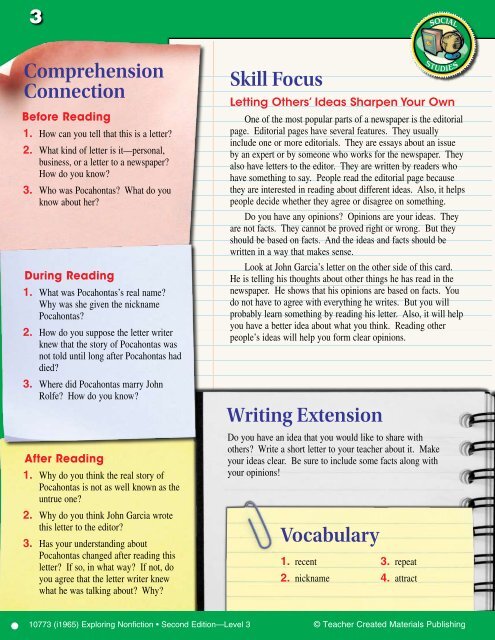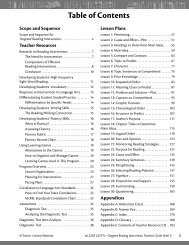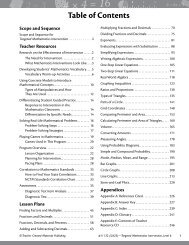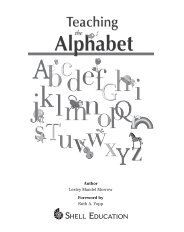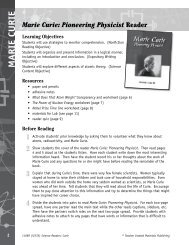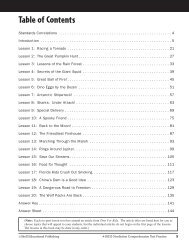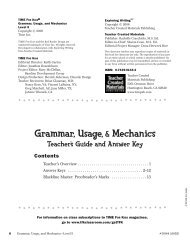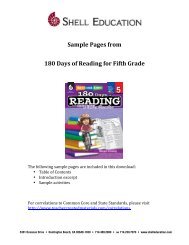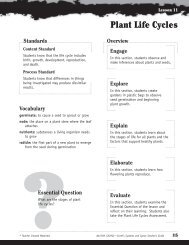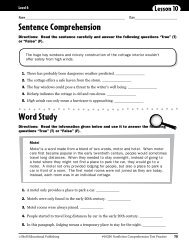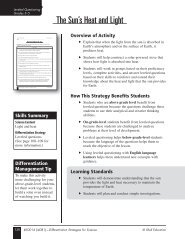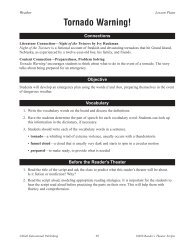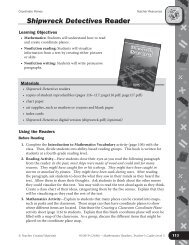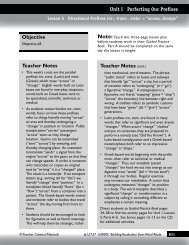The Real Pocahontas - Teacher Created Materials
The Real Pocahontas - Teacher Created Materials
The Real Pocahontas - Teacher Created Materials
You also want an ePaper? Increase the reach of your titles
YUMPU automatically turns print PDFs into web optimized ePapers that Google loves.
3<br />
Comprehension<br />
Connection<br />
Before Reading<br />
1. How can you tell that this is a letter?<br />
2. What kind of letter is it—personal,<br />
business, or a letter to a newspaper?<br />
How do you know?<br />
3. Who was <strong>Pocahontas</strong>? What do you<br />
know about her?<br />
During Reading<br />
1. What was <strong>Pocahontas</strong>’s real name?<br />
Why was she given the nickname<br />
<strong>Pocahontas</strong>?<br />
2. How do you suppose the letter writer<br />
knew that the story of <strong>Pocahontas</strong> was<br />
not told until long after <strong>Pocahontas</strong> had<br />
died?<br />
3. Where did <strong>Pocahontas</strong> marry John<br />
Rolfe? How do you know?<br />
After Reading<br />
1. Why do you think the real story of<br />
<strong>Pocahontas</strong> is not as well known as the<br />
untrue one?<br />
2. Why do you think John Garcia wrote<br />
this letter to the editor?<br />
3. Has your understanding about<br />
<strong>Pocahontas</strong> changed after reading this<br />
letter? If so, in what way? If not, do<br />
you agree that the letter writer knew<br />
what he was talking about? Why?<br />
Skill Focus<br />
Letting Others’ Ideas Sharpen Your Own<br />
One of the most popular parts of a newspaper is the editorial<br />
page. Editorial pages have several features. <strong>The</strong>y usually<br />
include one or more editorials. <strong>The</strong>y are essays about an issue<br />
by an expert or by someone who works for the newspaper. <strong>The</strong>y<br />
also have letters to the editor. <strong>The</strong>y are written by readers who<br />
have something to say. People read the editorial page because<br />
they are interested in reading about different ideas. Also, it helps<br />
people decide whether they agree or disagree on something.<br />
Do you have any opinions? Opinions are your ideas. <strong>The</strong>y<br />
are not facts. <strong>The</strong>y cannot be proved right or wrong. But they<br />
should be based on facts. And the ideas and facts should be<br />
written in a way that makes sense.<br />
Look at John Garcia’s letter on the other side of this card.<br />
He is telling his thoughts about other things he has read in the<br />
newspaper. He shows that his opinions are based on facts. You<br />
do not have to agree with everything he writes. But you will<br />
probably learn something by reading his letter. Also, it will help<br />
you have a better idea about what you think. Reading other<br />
people’s ideas will help you form clear opinions.<br />
Writing Extension<br />
Do you have an idea that you would like to share with<br />
others? Write a short letter to your teacher about it. Make<br />
your ideas clear. Be sure to include some facts along with<br />
your opinions!<br />
Vocabulary<br />
1. recent<br />
2. nickname<br />
3. repeat<br />
4. attract<br />
l<br />
10773 (i1965) Exploring Nonfiction • Second Edition—Level 3 © <strong>Teacher</strong> <strong>Created</strong> <strong>Materials</strong> Publishing


